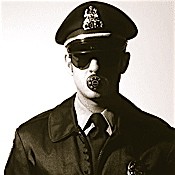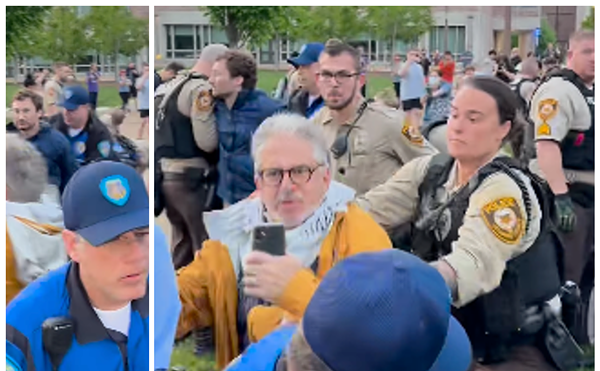Yesterday the St. Louis Post-Dispatch broke a story of significant local import on its Web site.
No, not the "news" that Cy Young Award-winning pitcher Chris Carpenter will undergo elbow surgery and miss the rest of this season and most of next.
Though now that you mention it, am I the only one irritated that the Post needs to trumpet, way up high in the story, the fact that "the club confirmed [the treatment plan] about 90 minutes after the Post-Dispatch first reported it on its website, STLtoday.com"?
The story to which I refer was a much shorter one, written by investigative reporter Carolyn Tuft, which revealed that two American Civil Liberties Union lawyers have sued the St. Louis Metropolitan Police Department, demanding the release of internal-affairs investigative files pertaining to the theft last fall of numerous World Series tickets by eight SLPD officers. The suit was filed on behalf of John Chasnoff, of the local activist group Coalition Against Police Crimes and Repression.(The officers confiscated the tickets from scalpers around Busch Stadium, then handed them out to friends and family, who used them for admission, then returned them to the cops, who tucked them back into the department's evidence locker. The scam was made possible by the fact that tickets at the new Busch are scanned for their bar codes, and not torn. That same fact, however, made it possible for investigators to determine that the tickets seized for evidence had been used to enter the stadium.)
I wish Mr. Chasnoff luck with his suit.
I'd like to be able to muster more enthusiasm, but Mr. C and his law team have an uphill battle ahead of them.
They're going to argue that the internal-affairs file is a "public record" by virtue of the fact that it concerned a probe into "criminal conduct."
That might seem, on its face, to be a no-brainer. But the SLPD's lawyers are going to counter that the officers' misdeeds, illegal though they might have been, don't fall under the definition of "criminal conduct."
How do I know this? I know this because I'm familiar with this particular line of argument, having been on the receiving end of it in the past.
Four years ago RFT published a story about how SLPD officers had allegedly vandalized private property during an ill-advised crackdown preceding the May 2003 meeting of the World Agricultural Forum.
In "Legal Loopholes," then-staff writer Bruce Rushton reported that attorneys for the SLPD had denied Riverfront Times' request to examine the internal-affairs investigative file concerning the matter, on the grounds that the nature of the complaint did not involve "criminal behavior." Rather, the department argued, the case turned on whether officers had violated a "city ordinance."
That's where the "loopholes" came in. In 2002, ruling on the case now known as Guyer v. Kirkwood, the Missouri Supreme Court unanimously ruled that internal-affairs files are public records when officers are suspected of criminal conduct. So by arguing that conduct could be illegal but not criminal, the SLPD lawyers could effectively deny access to investigative files.
And if you don't like that finding, you've got to take them to court in order to fight it. And as the cops and their attorneys well know, that requires time -- and money.
Appropriately, John Chasnoff found his way into Rushton's story. Chasnoff's quote:
"Time after time, they say that they'll investigate themselves, but no reports are ever issued, complainants are not given the results of investigations and there's no reason to believe that investigations are even thoroughly completed. In this World Agricultural Forum case, the police vowed there would be an investigation, but nothing's been issued publicly to let the public know the department is holding itself accountable. For the department to claim that their investigation didn't include any look into possible criminal violations tells me that they haven't conducted an adequate investigation."
Of course, the loophole in Guyer doesn't always provide a suitable fig leaf. In those instances, the SLPD has found other ways to obfuscate.
In February of 2004, RFT published a story that more generally addressed the department's internal-affairs investigations. That article, also by Rushton, examined a recent phenomenon, namely, that the number of allegations of police brutality had plummeted over the course of the preceding decade.
Was this, Rushton wondered, due to a kinder, gentler St. Louis police force?
His conclusion, perhaps not surprisingly, was: no. It was due to the fact that 1) the police department had made it increasingly difficult for aggrieved parties to instigate IA investigations, and that 2) the department had succeeded in shielding the entire process from public view, by destroying most of the records and heavily redacting the rest.
You can read Rushton's entire story here. Dude tends to write long, though. So if you're pressed for time, may I suggest:
"[W]hen the Riverfront Times filed a public-records request...for internal-affairs documents on cases dating back to April 1, 1997, involving officers suspected of criminal conduct...[i]t took the department three full months to produce paperwork. First came one-page summaries of 40 complaints, all of them censored to obscure the names and badge numbers of accused officers. The department subsequently produced 28 more summaries, similarly redacted. Some of the summaries were incomplete, cut off in mid-sentence at the end of the first page, before narratives revealed the gist of alleged wrongdoing."The department didn't hand over any investigative files detailing how complaints had been handled. In most cases, the records that were furnished did not even indicate whether the complaints had been sustained or disproven.
"The police did, however, supply a bill. To cover 30-plus hours of staff time spent compiling the paperwork, the department sent along an invoice -- for $1,090."
But we were talking about the ticket-scalping case, right?
Right.
RFT staff writer Kristen Hinman had got wind of those allegations back in late October of 2006, shortly after the conclusion of the World Series. Calls to the SLPD for comment proved fruitless, however, and a few anonymous gripers weren't enough to build a story on. It wasn't until March of this year that some of the gripers went public with their allegations.
At that point Hinman wrote this post on the blog. (We, ahem, broke the story, BTW; the Post didn't weigh in till four days later.)
Hinman also filed a public-records request, which, thanks to the miracles of modern technology, you can see here, along with the response from SLPD general counsel Jane Berman Shaw.
Meanwhile, the World Agricultural Forum protesters still await the day when they can confront the SLPD in court. Their case (which we updated here) has been pushed back to the first week in October.
(And yeah, this makes two posts about old Bruce Rushton stories in two days. Go figure.)






